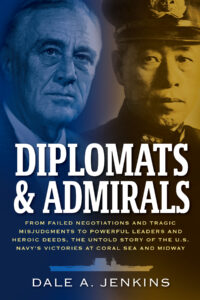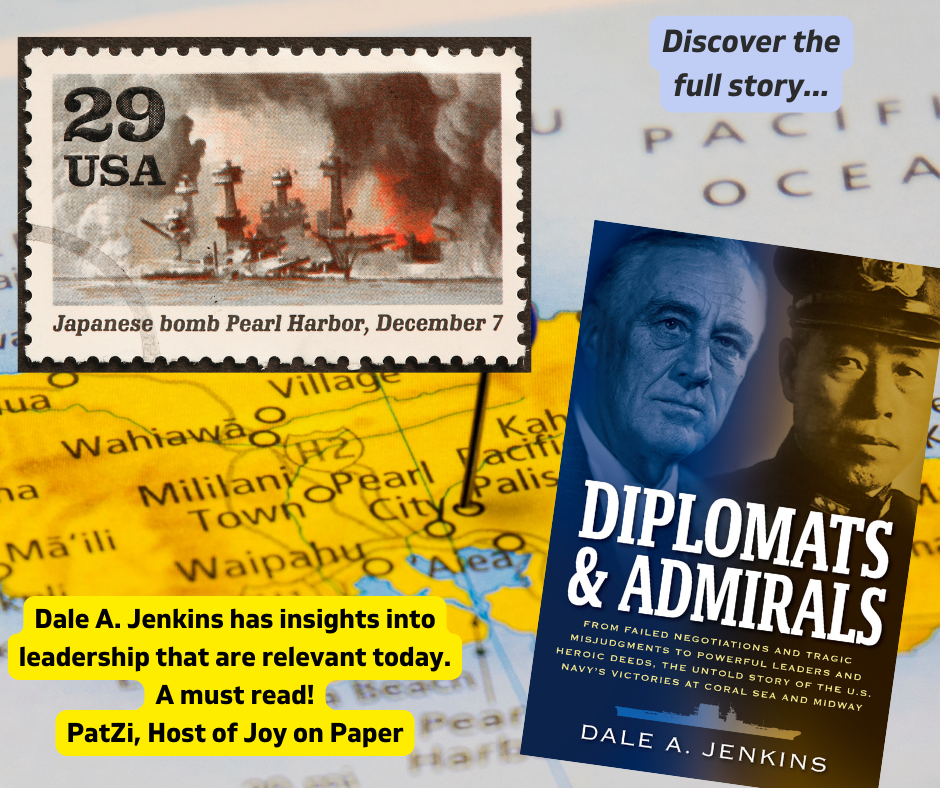It was such a pleasure. to talk to Dale A. Jenkins about his book: DIPLOMATS & ADMIRALS:. From Failed Negotiations and Tragic Misjudgments to Powerful leaders and Heroic Deeds, the Untold Story of the Pacific War from Pearl Harbor to Midway.
Diplomats & Admirals is an important book–a deep look into the past that shines light of the present. We talk about learning from history–but do we? Have we? This beautiful researched book delves deeply into the mistakes that led to Pearl Harbor and about the mistakes made once the war was started. There were many things that could have been done differently. We can’t change the past, but perhaps we could be humble enough to learn from mistakes and learn from them.
If you are wondering what you can do about the current mess in this world, read Diplomats & Admirals. It will open your eyes. You will view current events in a new light and perhaps discover the questions you should be asking of our leaders.
Rarely does a history book take you closer to the action than Diplomats & Admirals. As a former U.S. Navy Officer, Dale Jenkins’ powerful description of the Battle of Midway reads like a thriller. He takes us to scene of action as he analyzes what went wrong–and finally–what went right. As so often in life, sometimes it is one man who does one brave thing that changes the outcome. In this book, we meet that man.

About the Book:
It’s November 1941. Japan and the US are teetering on a knife-edge as leaders on both sides of the Pacific strive to prevent war between them. But failed diplomacy, foiled negotiations, and possible duplicity in the Roosevelt administration thwart their attempts.
Drawing on now-declassified original documents, Diplomats & Admirals reveals the inside story of one fateful year, including:
- How the hidden agendas of powerful civilian and military leaders pushed the two nations toward war
- The miscommunications, misjudgments, and blunders that doomed efforts at peace
- China’s role in the US ultimatum that triggered the attack on Pearl Harbor
- Why the carrier-to-carrier showdown at Coral Sea proved a fatal mistake for Japan
- How courageous US navy pilots snatched victory from defeat at the Battle of Midway
The defining events of WWII could have ended very differently. Combining perspectives from both military and civilian leaders, Diplomats & Admirals uncovers new insights into the Pacific naval battles that shaped the world—and the men behind them.
Listen to interview...
Buy this great book today...
Praise for Diplomats & Admirals
Dale Jenkins’ fascinating and highly readable new book focused on the months before and after Pearl Harbor offers startling new facts regarding what happened in key, early battles, including the Pearl Harbor attack, the aborted relief of Wake Island and the opening moves of the Battle of Midway. Based on entirely new research and previously overlooked documents, it provides valuable insight as naval leaders ponder a threatening power in the islands of the South China Sea and Western Pacific.
—John F. Lehman, Former Secretary of the Navy
Could war with Japan have been avoided? In attempting to answer this question, Dale Jenkins puts forth an intriguing interpretation of diplomatic activities leading to war with Japan in 1941.
—Philip L. Dunmire, Past National President, Navy League of the United States
A cautionary historical tale with haunting contemporary relevance, Diplomats & Admirals is a phenomenal book and a “must read” for anyone in search of a deeper understanding of World War II, or even a clearer perspective on how seemingly minor events can cascade into a moment of incredible historical importance. Jenkins is a wonderful storyteller with a rare ability to transform what might otherwise be a dry historical study into a truly captivating and provocative fireside chat. Diplomats & Admirals is a necessary addition to the library of any professional diplomat or strategist.
–Steven Matthew Leonard, senior fellow at the Modern War Institute and the co-founder of the national security blog, Divergent Options
Dale Jenkins has spent years studying one of the greatest dramas of the twentieth century: the months surrounding the destruction of America’s Pacific Fleet at Pearl Harbor. The impressive result, Diplomats & Admirals, is a lucid and absorbing account of how two nations groped their way toward the cataclysm through a thicket of mutual misunderstandings and an equally gripping look at the half year of sea war that followed the attack on Pearl, from the gallant and tragic defense of Wake Island to the near-miraculous American victory at Midway, after which Japan had no further hope of prevailing. Told throughout with the greatest verve and authority, Diplomats & Admirals belongs on the shelf of anyone who is interested in the Second World War—and anyone who relishes a well-wrought tale of momentous events.
—Richard Snow, author of A Measureless Peril: The Fight for the Atlantic and Iron Dawn: The Monitor and the Merrimack
In Diplomats & Admirals, Dale Jenkins combines the internecine imbroglios of diplomatic breakdowns between the United States and the Empire of Japan with the harsh reality of war. Dale Jenkins puts his readers in the embassies and backrooms before Pearl Harbor and aboard the ships, on the beaches, in the air, and in FDR’s White House with the skills of a true historian and talented storyteller.
—Tim McGrath, two-time winner of the Commodore John Barry Book Award and author of the critically acclaimed biography John Barry: An American Hero in the Age of Sail and Give Me a Fast Ship: The Continental Navy and America’s Revolution at Sea
Sometimes history paints events as inevitable. Dale Jenkins, a former U.S. naval officer and staff director of the Council on Foreign Relations, has made an insightful study of the economic and foreign policies of the United States and Japan during the six months leading up to December 7, 1941. Jenkins deftly demonstrates that better communication and planning between civilian and military leaders in both countries might well have avoided the attack on Pearl Harbor—literally at the last second—but for diplomats who allowed Great Britain and China to influence the course.
—Walter R. Borneman, Author of The Admirals: Nimitz, Halsey, Leahy, and King




